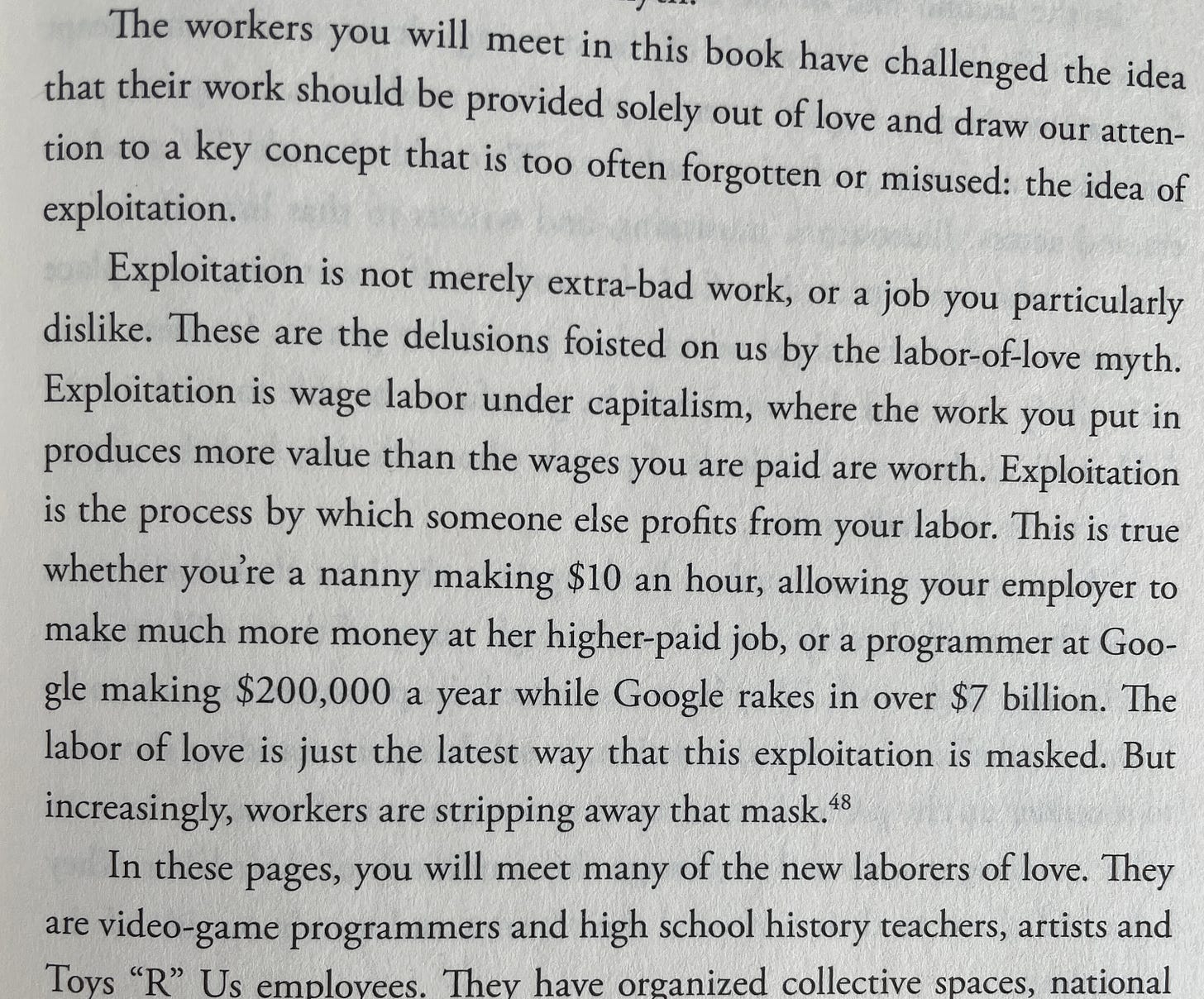When Writers and Actors Are Accused of Cosplaying Labor Activists
Labor journalist Sarah Jaffe on the 'mystification' of Hollywood, the trap of the 'labor of love,' and the villainization of the studio system
Something I’ve encountered time and again, often in whispers, sometimes quite loudly in comments sections, is the idea that the writers and actors on strike are essentially cosplaying labor activists. That they are flaky artists ill-suited to the task of “actual” (read: manual) labor, that they get to do what they love, and that for the amount of money they get paid when they do acquire work, they should be happy with what they get, which is far more than the average hourly worker in America gets.
Setting aside the actual talking points of the negotiations for a day, let’s take a closer look at this idea. (And don’t worry, we’ll get to the Evil Studio Executive trope another day.)
Labor journalist and Work Won’t Love You Back author Sarah Jaffe joined me on The Ankler podcast to break down the “mystification” of the Hollywood creative process and the trap of the “labor of love,” i.e. “when you are accustomed to begging for your job and being grateful for your job, when you are put in this position where your relation to your employer is one of eternal gratitude just for getting to have a job.”
For the entertainment industry in particular, “that's the mystification of it, that we want to pretend that there's not a labor process involved in this, but there is,” she tells me. “We want to pretend that we're all in this business because we love the films and if we weren't, then we would be working in finance instead or something like that.”
This is perhaps my favorite conversation I’ve had about labor since I started writing Strikegeist. In it, Jaffe and I chat about: The Devil Wears Prada as labor movie (3:13), the history of the commercialization of art (13:23), the “I’m just happy to be here” mentality cultivated among creatives in the entertainment industry and elsewhere (22:12), the villainization of the studio system (28:27), the “Fordist compromise” of auto assembly lines and how it relates to commercial art and the development of A.I. (32:25), and more.
Listen here, and read a couple of excerpts below. Very curious what you all make of Jaffe’s thoughts. Once you’re done listening, talk to me: elaine@theankler.com.
On being “happy to be here” and of being in a high-risk industry:
“There's two sides to that story. One is, and especially this is the lie that they tell women, is that you need to ask for more, and women don't get raises and we don't get equal pay because we don't ask for it. But then when you ask for it, it's like, ‘How dare you?’ And I have had this experience personally: ‘How dare you ask for more. You should be grateful just to be here.’ Brett Ratner — to talk about somebody who makes a lot of money, some hits, and mediocre films at best — he doesn't roll into a meeting with somebody and say, ‘Oh, I'm grateful just to be here.’ He says, ‘Give me [my] however-many-million-dollar budget.’”
On the villainization of the studio system:
“It's not that the studio is an evil institution any more than any other institution in capitalism is an evil institution. It's just that it's designed to make money and accumulate at the top because that's how the system works. It's not that these guys are uniquely terrible people. Jeff Bezos isn't even a uniquely terrible person. He's easy to hate, but this is how the thing is designed. It is designed to siphon money upwards. It will keep doing that, absent workers making enough hell to change the distribution. That's just what it's designed to do.”
On Hollywood as profit-making machine:
“It's not like the studio heads are personally mad at Fran Drescher. It's not like they've decided, ‘We are just going to squash these hopeful kids who move here to try to be actors.’ No, but it's to their advantage to give those workers as little rights as possible, to give them as little opportunity to move upward as possible. It's just to associate it even with greed is often to be too personal about it. It's a system that is designed to make money. It's not a system that's designed to make most people happy. That's just been true of capitalism since its founding.”
On being paid well:
As for the notion that being highly paid means that you cannot be taken advantage of, Jaffe has this to say in the introduction to Work Won’t Love You Back:
Today in Strike News
Real Time host Bill Maher voiced his thoughts on the strike, which placed a level of blame on the WGA. “They’re asking for a lot of things that are, like, kooky,” Maher says. “What I find objectionable about the philosophy of the strike [is] it seems to be, they have really morphed a long way from 2007’s strike, where they kind of believe that you’re owed a living as a writer, and you’re not. This is show business. This is the make-or-miss league.” (Variety)
Many disabled writers and actors believe that the picket lines have had a number of basic accessibility issues, in addition to some poorly phrased rallying cries. “The very first picket I went to at Paramount, the chant was ‘Stand up, fight back.’ Even though you’re using it metaphorically, there’s no reason we have to use the words ’stand up,’” says Christine Bruno, a SAG-AFTRA member. “We’ve got to expand our language. Accessibility isn’t just physical access. There’s a difference between disability inclusion and disability equity.” (The Hollywood Reporter)
The Film Academy’s Governors Awards, this year set to honor Mel Brooks and Angela Bassett among others, are moving from November to January to account for the ongoing strikes. (Variety)
Despite an inability to write new questions and many contestants boycotting the show, recent evidence points to Jeopardy! running new episodes through December 1. (Newsweek)
A group of executive producers from the CW show Arrow are selling strike-themed hats to benefit The Union Solidarity Coalition, which aids out-of-work crew members. (Comicbook.com)
Imax CEO Richard Gelfond quelled concerns over the impact on the company of Dune 2 moving to March, emphasizing the ability to now play The Marvels, the new Hunger Games prequel, and Martin Scorsese’s Killers of the Flower Moon. “Now that it moved, we can play all three and we have a great title next year in Dune … We have a lot of levers to push,” Gelfond told an investors conference. “So, no, I don’t think people are that worked up about the strikes.” (The Hollywood Reporter)
Additional reporting for Today in Strike News by Matthew Frank







I believe Sarah Jaffe's reductionist characterization of the motivations for studio execs' behavior before and during the WGA/SAG strike as being "just the way capitalism is" misses a critical distinction between AMPTP members and other "capitalist" companies that have cultivated a strong culture and collaborative labor relations. Examples include Costco, In-N-Out Burger, and Four Seasons, all of whom employ a large number of relatively low income employees and contractors and Bain, Amex and Apple, with a large contingent of high earners.
It's important to note that ALL of these companies have enjoyed long-term financial success, some paying above-market compensation (e.g. Costco) and some not (e.g. Apple). But what ALL have in common is a management attitude that recognizes the value of an inclusive corporate culture that genuinely nurtures mutual respect.
The harsh reality is that the underlying economic model of the movie/TV industry is severely broken, making it hard to come to a mutually acceptable outcome even if labor relations in this industry were far better. But toxic labor relations aren't an inevitable consequence of capitalism. It's the result of ongoing concerted effort by management and labor leaders. Here's hoping cooler heads prevail.
I don't think writers and actors are cosplaying labor activists but it's grating to hear and read many writers, actors and those who cover the industry constantly refer to the Hollywood strikes as the vanguard of the labor movement, ignoring the fact that working class people in hotels, fast food chains, warehouses, Amazon fulfillment centers, etc have been organizing and striking in large numbers for the past several years. And winning some battles to boot. One of the writers of "The Bear" has been featured on television news (and I believe in this newsletter) making such a statement - using the "vanguard" word. This very newsletter made mention yesterday of Starbucks workers "looking to unionize" and presumably taking inspiration from striking actors/writers, when in reality Starbucks workers in shops across the country have been organizing and in many cases unionizing for years. The labor movement is generally built on solidarity - by acting as though they're at the forefront of the labor unrest in this country, when the great unwashed have been agitating for the past several years (to some success), many writers and actors are displaying the opposite of that.